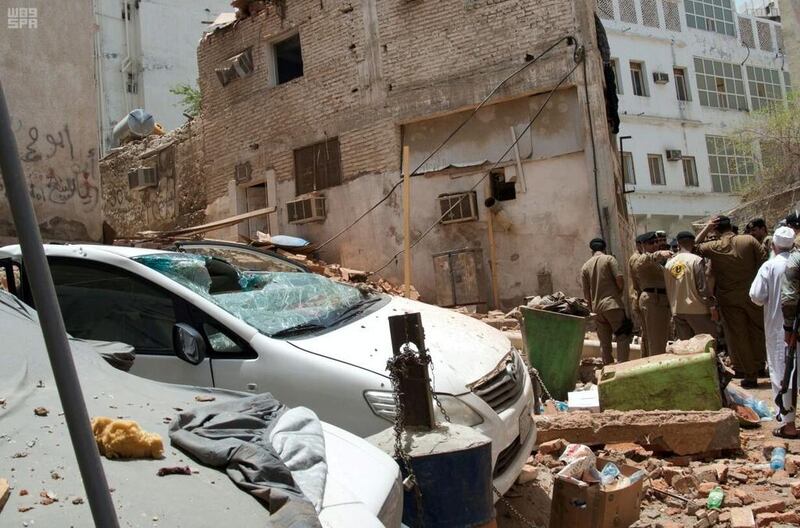RIYADH // A suicide bomber blew himself up near the Grand Mosque in Mecca as police disrupted a plot to target the holiest site in Islam as Ramadan ends, Saudi security forces said on Saturday.
The interior ministry said it launched a raid around Jeddah, as well as two areas in Mecca itself, including the Ajyad Al Masafi neighbourhood near the Grand Mosque where the suicide bomber blew himself up. Five people were arrested, including a woman.
The plot targeted “the security of the Grand Mosque, pilgrims and worshippers”, ministry spokesman Gen Mansour Al Turki told Saudi television.
Hundreds of thousands of worshippers had gathered for at the mosque for prayers on the last Friday of Ramadan.
Police said the bomber detonated his explosives after a shoot-out at a three-story house in Ajyad Al Masafi. The blast caused the building to collapse, injuring six foreign pilgrims and five members of security forces, the interior ministry said.
Saudi state television aired footage taken after the raid near the Grand Mosque, showing police and rescue personnel running through narrow streets. The collapsed walls of the building had crushed a parked car and nearby structures were peppered with what appeared to be shrapnel and bullet holes.
An interior ministry statement said the “terrorist network, whose terrorist plan was thwarted, violated, in what they would have perpetrated, all sanctities by targeting the security of the Grand Mosque, the holiest place on Earth. They obeyed their evil and corrupt self-serving schemes managed from abroad whose aim is to destabilise the security and stability of this blessed country.”
It did not name the group involved in the attack.
The UAE condemned the attempt to target the Grand Mosque and expressed solidarity with Saudi Arabia.
“This heinous crime will make us even more formidable and determined to eliminate terrorism and eradicate its sources along with all those who finance, incite, sympathise with, or justify it in any manner whatsoever,” said Sheikh Abdullah bin Zayed, Minister for Foreign Affairs and International Cooperation.
Saudi Arabia battled an Al Qaeda insurgency for years and more recently has faced attacks from a local branch of ISIL. Neither group immediately claimed involvement in the foiled plot, although ISIL sympathisers online have urged more attacks as an offensive in Iraq slowly squeezes the extremists out of Mosul and their self-declared capital of Raqqa in Syria comes under daily bombing from a US-led coalition.
Saudi authorities have arrested around 40 people, including Saudis and Pakistanis, for alleged extremist links since July last year, when a suicide bombing near the Prophet’s Mosque in Medina killed four members of its security forces. The same day, separate suicide bomb attacks targeted a Shiite mosque in eastern Saudi Arabia and near the US consulate in Jeddah.
Saudi Arabia’s counter-terrorism capabilities, which for years were led by the former crown prince and interior minister Mohammed bin Nayef, are well-regarded internationally.
On Wednesday, he was replaced as crown prince by King Salman's son, defence minister Mohammed bin Salman, who is the architect of Saudi Arabia's two-year-old war in Yemen against Iran-backed rebels and has taken a hard line against Iran.
Saudi Arabia and other Arab countries have cut diplomatic ties with neighbouring Qatar and are trying to isolate the country over its support of militants, which Qatar denies, and ties to Iran.
* Associated Press and Agence France-Presse





